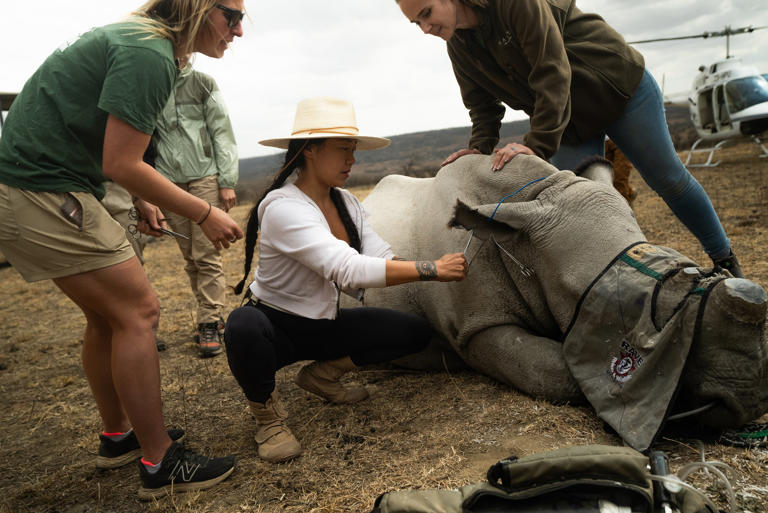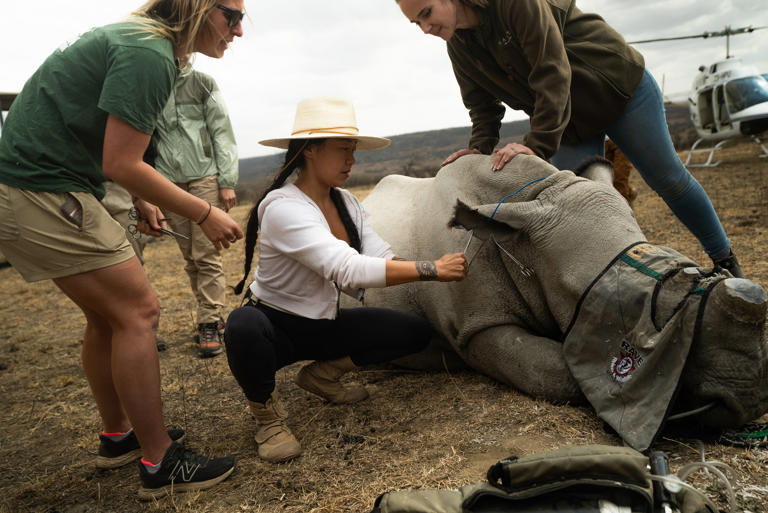
Story by Emma Brain
Save the rhino. That was the overarching goal of a trip I took to South Africa this month, alongside a group of other UAE residents. The species that once roamed the continents of Europe, Asia and Africa now tragically has a global population of about 27,000, the majority of which are in national parks and reserves.
These majestic and distinctive animals have been decimated by poaching, with their horns being used for unfounded medicinal practices and as prestige value, exacerbated by habitat loss. In South Africa, 229 were killed in the first half of this year alone. The northern white rhino is all but extinct, with only two elderly and infertile females remaining.
Global co-operation, awareness and education are crucial in saving the rhino from being wiped out for good. That’s where organisations such as Wilde Tracks come in. Founder Chloe Evans, a British national who lives in Dubai, says: “Wilde Tracks was born out of a burning desire to make a tangible impact on animal conservation. I saw an opportunity to help crucial conservation projects globally, but knew I wanted to do more than ask for funding.
“I’ve always believed in the power of a community to bring about change, so I created a travel-with-purpose organisation that directly contributes to vital conservation work while offering a community of passionate individuals a once-in-a-lifetime experience that might otherwise be inaccessible for many.”
Removing the horns from rhinos to save their lives is necessary. Horn is purely keratin, the same substance that human fingernails and hair are made from, and the process involves members of the anti-poaching units locating an animal, which is then darted from a helicopter. The horn, or regrowth, is then sawn off and the remaining ground down so there is nothing left for poachers to kill the animal for.
Rhinos also have their ears notched for identification and they’re microchipped or fitted with tracking devices. This is all carried out by an experienced vet and medical team to ensure the welfare of each animal. Every member of our group had the opportunity to be a part of this process, and just being close to these incredible animals was a truly emotional experience.
When I asked a member of the anti-poaching team how he got involved in these conservation efforts, he said, at first, it was just a job, but spending every day with these animals he’s grown to love them and will do anything to protect them. “How can you protect something you don’t love?” he says.

During the trip, we also changed the tracking collars on a lioness and a cheetah as well as giving them a health check. Collaring predators is crucial for researchers to track movements and understand behaviour, to help prevent human-animal conflicts and maintain biodiversity.
Dr Benazir Ameer Ali joined the trip alongside her daughter Inaaya, who wants to be a wildlife vet. Inaaya is now more inspired to educate others. “Each one of us has a part to play and raise awareness,” she says. “We can always talk to others about the trip, show them photos and videos about the hands-on experience we had in the wild.”
Teacher Kavya Rachael Gojer, who was also on the trip, says that while facts and figures are out there, people can only really understand what’s happening with endangered species if they see it themselves. “The most significant lesson I took from this trip is realising just how endangered so many animals around us truly are,” she adds. “It’s everyone’s responsibility to take action and protect these animals if we want them to survive in the future.”
Each one of us has a part to play and raise awareness. We can always talk to others about the trip, show them photos and videos about the hands-on experience we had in the wild.
Inaaya, aspiring wildlife vet
Melanie Perera, a senior credit controller from Sri Lanka, says she couldn’t turn down the chance to join in. “Everything was very new to me,” she says. “Honestly, I didn’t even know that rhinos were being poached for their horns. Going on this conservation intervention trip was a relatively easy way to know more about wildlife conservation efforts and to get involved yourself to make a real difference.”
While getting hands-on with the animals during this trip, another important aspect was educating children who live in poverty and who may turn to desperate ways to make money when they grow up. Australian Robyn Collins, another group member, says: “We spent all day in two schools and realised that for four months of the year, these children have no running water in the school. They cannot flush the loo, they cannot wash their hands or turn the tap on and drink water. There is a lot of suffering and some of the [bush meat] poachers are young kids hunting for their daily meal.”
These one-off experiences gave way to raise crucial awareness, education and funds for endangered animal conservation. It certainly left a lasting impression on this group and Evans says that as well as international endeavours, the UAE has an important part to play.
“The UAE has a flourishing ecosystem and has made incredible strides in conservation,” she adds. “I look forward to playing a role in its continued success and am eager to give back in a meaningful way by helping people to connect with nature and create a nature-loving community contributing to a sustainable future.”
___
More information about coming trips can be found on Wilde Tracks’ Instagram @wildetracks
